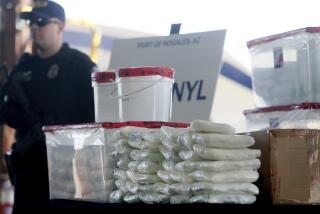Clinton to Seek Funds to Deter Terror Attacks
- Share via
WASHINGTON — Seeking to strengthen defenses against unconventional terrorist attacks, President Clinton today will unveil a plan to spend at least $2.8 billion in the coming fiscal year to protect Americans against chemical and biological weapon assaults and to guard crucial computer networks, White House officials said.
The budget request, which the president will detail in a speech at the National Academy of Sciences, reflects an overall program that could reach as high as $10 billion, when a wide range of other government efforts, including cooperative programs with Russia to guard nuclear stockpiles, are included.
“These are threats that are emerging. They are not threats that have hit our shores yet,” one official said, speaking on the condition of anonymity. “We are still ahead of the power curve.”
Nevertheless, the program, as described by White House aides, is intended to step up preparations to not only protect against such attacks, but to cope with their impact if they occur.
Clinton Speaks With Greater Urgency
Clinton has spoken with increasing urgency in recent months about what he sees as the need to upgrade the nation’s defenses against unconventional weapons as the threat of nuclear attack from old Cold War adversaries has receded. It was the focus of an address he delivered at the Naval Academy in May, and he touched briefly on the topic in his State of the Union message Tuesday night.
In the administration’s view, the bombings of the World Trade Center in 1993 and then the federal building in Oklahoma City demonstrated the nation’s vulnerability.
The president’s budget request, which will be presented to Congress on Feb. 1, is likely to include a plan to spend $1.336 billion on programs intended to prepare the United States to deal with the potentially devastating effect of an attack by chemical or germ weapons, and $1.454 billion for computer security programs.
The spending, if approved by Congress, would roughly double the amount devoted to such anti-terrorist programs over a two-year period.
“The president’s announcement is consistent with our overall anti-terrorism strategy of deterring, preventing and preparing against potential chemical, biological and cyber attacks,” said David C. Leavy, the National Security Council’s director of communications. “The president will talk about how we can better prepare ourselves against chemical and biological attack as we confront the new threats posed by Osama bin Laden and other terrorists.”
Bin Laden has been described as the mastermind behind the bombings at the U.S. embassies in Kenya and Tanzania last August.
Campaign to Increase Medical Research
Protection against attack by unconventional weapons would be built around a campaign to increase medical research to develop and distribute vaccines and other medicines needed to counteract biological agents, to diagnose agents to enhance speedy responses, and to stockpile antidotes.
In addition, attention would be devoted to training and equipping medical, law enforcement and other emergency personnel who would be most likely to be called upon to provide treatment in the initial stages of a chemical and biological attack, one White House official said.
Another said that public health systems would receive special training and databases would be constructed to help medical personnel make rapid diagnoses of the nature of the agents used in an attack.
The computer protection would be built around guarding computer networks of banking, communication and utility industries, out of concern that they are among the vulnerable points in an attack intended to cripple the U.S. economy. Spending would be increased on research intended to develop computer programs that would detect intrusions and attempts to place erroneous codes in critical networks.
“Terrorist groups or rogue states would want to bypass our strength, our military, to weaken our economy through the private sector,” the official said.
Speaking with reporters Tuesday before Clinton’s State of the Union address, National Security Advisor Samuel R. “Sandy” Berger said the president intends to establish a national preparedness office to oversee training in 120 cities.
The computer program would protect critical infrastructure points, including transportation, water, military and financial systems, and send out warnings to an entire network when one computer is attacked.
“We must work to keep terrorists from disrupting computer networks. We must work to prepare local communities for biological and chemical emergencies, to support research into vaccines and treatments,” Clinton said in his State of the Union speech.
More to Read
Sign up for Essential California
The most important California stories and recommendations in your inbox every morning.
You may occasionally receive promotional content from the Los Angeles Times.













